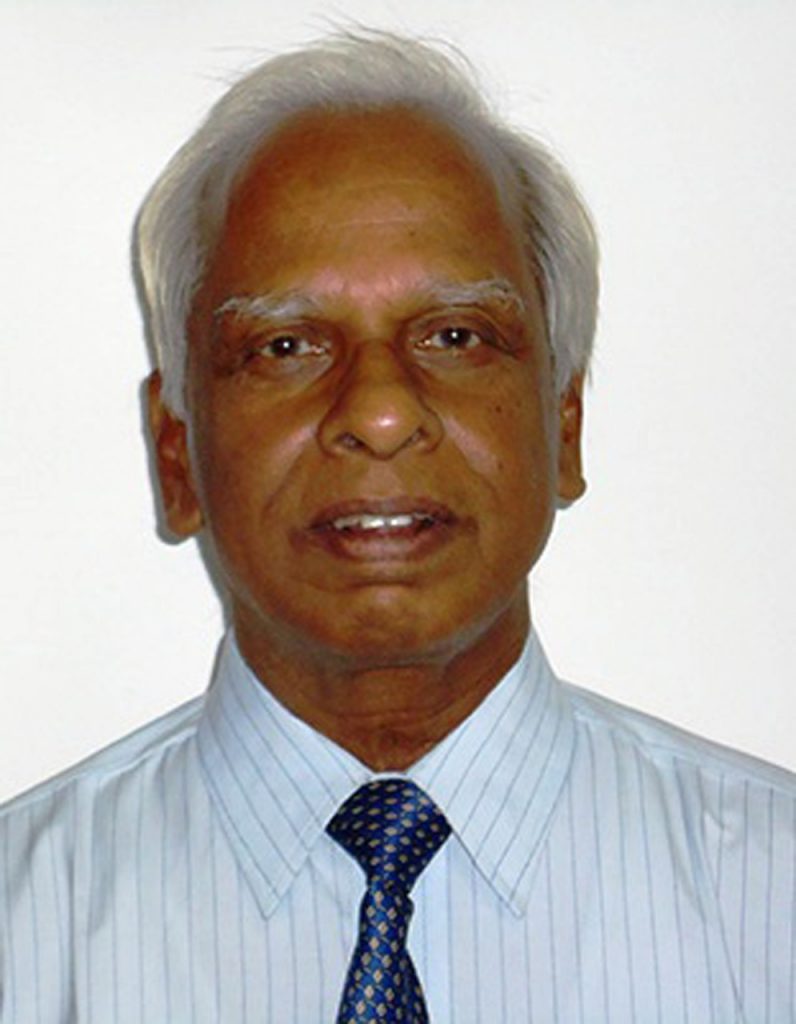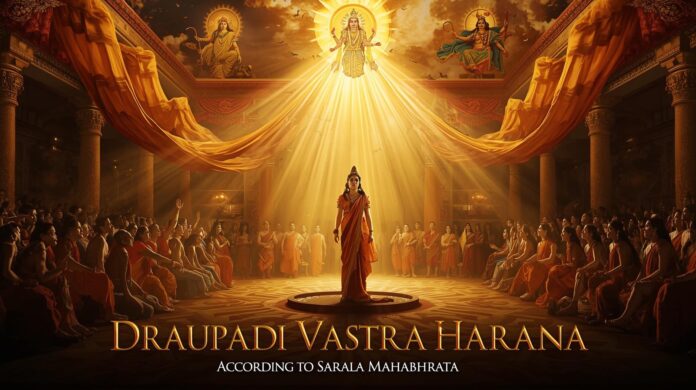Sarala Das’s Mahabharata, popularly called Sarala Mahabharata, is not a translation of Vyasa’s Mahabharata (referred to often as Vyasa Mahabharata) but a creative retelling of it. Sarala Das, the fifteenth-century Odia poet, reconceptualized the classical narrative and retold it in the Odia language. With Sarala’s three compositions, namely, Vilanka Ramayana, Chandi Purana, and Mahabharata, of which the last-named is the most famous, the rich tradition of Odia Puranic literature began.
Draupadi’s vastraharana (disrobing) is a pivotal episode in Sarala’s Mahabharata. The humiliation of Draupadi in King Duryodhana’s court led to the Great War at Kurukshetra, which ended with the destruction of the Kauravas. The attempt to disrobe Draupadi in the court can be justly called a turning point in the narrative. Till that event, Draupadi was a typical daughter-in-law. There is no evidence in the narrative that she had displeased anyone in the Kuru family, comprising the Kaurava and the Pandava branches, and that anyone was displeased with her. As for Karna, she had never said anything that would have upset him. In the world of Sarala Mahabharata, everyone knew – the Pandavas knew it from their childhood – that Karna was the eldest son of Kunti. Karna knew that Draupadi was his younger sister-in-law. Neither Karna nor Draupadi ever did anything that would have undermined the dignity and the sanctity of their relationship.
Earlier, during her swayamvara, unlike in Vyasa Mahabharata, she did not say that she would not marry a suta putra (son of a charioteer); she did not dissuade him from participating in the archery test. He took the test to win her for his friend Duryodhana but failed. She had never laughed at Duryodhana, and she did not insult him by saying that he was blind like his father. If Duryodhana wanted to humiliate her in public, it was because he wanted to humiliate the Pandavas in a manner that would hurt them most.
Dussasana dragged Draupadi by her hair all the way from Varunavanta to Hastinapura in full public view. People were sympathetic to her, but no one even raised a voice of protest, fearing punishment at the hands of the Kauravas. At the suggestion of Sakuni, who called her asati (unchaste) and said that she had no right to privacy on that account, Duryodhana asked Dussasana to disrobe Draupadi.
Draupadi said that she could not understand how it was that no one in that assembly, where there were virtuous persons like Bhishma, Drona, and Bhurishrava, among others, had protested against the wrongdoing by the Kauravas. She also questioned the legitimacy of Yudhisthira’s wagering her after losing himself to Duryodhana. None of the venerable persons uttered a word, fearing the wrath of King Duryodhana. Unlike in Vyasa’s Mahabharata, Draupadi did not address her questions and concerns to anyone in particular; she spoke to all those present in the court.
With eyes full of tears, she asked Yudhisthira whether her humiliation was not his humiliation as well. Yudhisthira felt ashamed and guilty but said nothing. Arjuna and Nakula told her that they were helpless because they did not have Yudhisthira’s permission to act. She asked Sahadeva whether, as the knower of the past and the future, he did not know that she was going to be humiliated in the court. Sahadeva told her that what was happening was pre-determined. He almost appealed to her to bear the insult because that would lead to the destruction of the Kauravas. Disappointed, she turned to Bhima, who told her that he was helpless because of Yudhisthira, but he thundered that he would avenge her humiliation.
Finding herself entirely helpless, she turned to Krishna. He responded to her prayer immediately and appeared in the sky along with his spouse, Satyabhama. None but she could see him or hear what he told her in response to her pleading for his help. He asked her to pray to god Surya (Sun god) for help and disappeared. On his way back to Dwarika, he reminded Surya deva about the help he had received from her in an earlier aeon and asked him to respond to her present situation. Draupadi prayed to Surya deva, who asked the divines Chhaya and Maya to provide her clothes. As Dussasana was disrobing her, unseen by everyone, including Draupadi herself, they were robing her. Dussasana’s effort was ceaseless, and the clothes were endless.
Thus, in Sarala’s Mahabharata, Krishna did not directly save Draupadi. She saw it herself that after advising her to pray to god Surya, he left. He told her that she had obliged him in an earlier existence and that she would now receive from him a great deal more than what she had given him. She had no memory of all these and had no reason to feel reassured that she would be saved by Surya deva. But so complete was Draupadi’s trust in Krishna and so complete was her surrender to him that without any feeling of doubt and uncertainty, she did what he had asked her to do. It could be said that what saved Draupadi was essentially her own karma. Krishna’s grace operated at a different level. Both Draupadi and Sun god had no memory of a specific event of an earlier aeon, in which they were connected. Krishna activated it and made god Sun do his duty. Thus, Sarala Mahabharata celebrates bhakti and grace but does not undermine the theory of karma; in the working of the system of karma (action) and its phala (fruit, i.e., consequence), God’s grace acts as intervention.
To return to the disrobing act, Bhishma realized that what was happening was alaukika (transcendental) and he intervened. He reprimanded Duryodhana sharply, asking whether he had become blind like his father, failing to see that what was happening was unreal and making sense of it. He warned him that the virtuous Draupadi’s anger could destroy them all. Draupadi cast an angry look at the palace and it started burning. The virtuous Bhanumati, Duryodhana’s wife, came running to the court to pacify Draupadi. Undeterred by what was happening, Dussasana kept pulling Draupadi’s clothes to disrobe her. Draupadi cast an angry look at him and he collapsed on the floor, and as Duryodhana was rolling down from the royal throne unconscious, Bhishma and Drona caught him.
On learning from Sanjaya what had happened in the court, Dhritarashtra, Gandhari, Vidura, and Sanjaya rushed there. They saw Bhanumati praying to Draupadi. In all humility, Dhritarashtra prayed to Draupadi, as one would to a goddess, to forgive his wicked sons and protect his lineage. She was pacified by his prayer. As the Kuru elder and head of the family, he freed her husbands from slavery to Duryodhana and returned to her all that Yudhisthira had lost in terms of material possessions. Soon after, as the Pandavas left Hastinapura for Varunavanta, there was much bonhomie between the Kauravas and the Pandavas. But inside, Bhima was seething with rage, and Draupadi did not tie up her hair.
It is interesting to note that the Kaurava brothers did not realize that Draupadi’s endless clothes were something non-normal and for that reason, would have a hidden meaning. Bhishma understood the significance of that happening and drew the attention of Duryodhana to it, but he showed no signs of responding to the venerable Kuru elder’s words, nor did any of his brothers. As for the Pandavas, the text says nothing about how they reacted to the endless clothes emerging from Draupadi and then to Bhishma’s words.
This lack of response to the unexpected happening in the real world is reminiscent of Noam Chomsky’s concept of “Orwell’s Problem.” There is so much evidence available to people regarding the happenings around them, but they often have a grossly inadequate or incorrect understanding of the same. This failure to learn could be due to various factors, including the degenerate data disseminated to the people by those who control the transmission of data. Now, if we look at the Kauravas’ failure to understand the happenings in the court, it is because of their belief that Draupadi was unchaste. Incidentally, because of its general applicability, one perhaps could think of Chomsky’s concept of “Orwell’s Problem” as an expression of the human condition, not merely of the present-day reality.
(The views expressed are the writer’s own)

Prof. B.N.Patnaik
Retd. Professor of Linguistics and English, IIT Kanpur
Email: bn.patnaik@gmail.com
(Images from the net)

